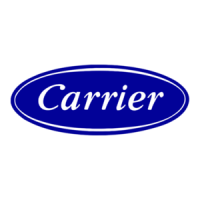5
Residential Packaged Units - 60Hz Puron
®
Rev.: 4 Jan., 2012
Horizontal Installation
Drain
Connection
1/4” (6.4mm)
for drainage
Figure 1: Hanger Bracket
Figure 2: Horizontal Unit Pitch
Horizontal Unit Location
Units are not designed for outdoor installation. Locate
the unit in an INDOOR area that allows enough space for
service personnel to perform typical maintenance or repairs
without removing unit from the ceiling. Horizontal units
are typically installed above a false ceiling or in a ceiling
plenum. Never install units in areas subject to freezing or
where humidity levels could cause cabinet condensation
(such as unconditioned spaces subject to 100% outside air).
Consideration should be given to access for easy removal of
the fi lter and access panels. Provide suffi cient room to make
water, electrical, and duct connection(s).
If the unit is located in a confi ned space, such as a closet,
provisions must be made for return air to freely enter the
space by means of a louvered door, etc. Any access panel
screws that would be diffi cult to remove after the unit is
installed should be removed prior to setting the unit. Refer to
Figure 3 for an illustration of a typical installation. Refer to unit
specifi cations catalog for dimensional data.
Conform to the following guidelines when selecting
unit location:
1.
Provide a hinged access door in concealed-spline or
plaster ceilings. Provide removable ceiling tiles in T-bar
or lay-in ceilings. Refer to horizontal unit dimensions for
specifi c series and model in unit specifi cations catalog.
Size the access opening to accommodate the service
technician during the removal or replacement of the
compressor and the removal or installation of the unit
itself.
2.
Provide access to hanger brackets, water valves and
fi ttings. Provide screwdriver clearance to access panels,
discharge collars and all electrical connections.
3. DO NOT obstruct the space beneath the unit with piping,
electrical cables and other items that prohibit future
removal of components or the unit itself.
4. Use a manual portable jack/lift to lift and support the
weight of the unit during installation and servicing.
The installation of water source heat pump units and all
associated components, parts and accessories which make
up the installation shall be in accordance with the regulations
of ALL authorities having jurisdiction and MUST conform to
all applicable codes. It is the responsibility of the installing
contractor to determine and comply with ALL applicable
codes and regulations.
>PP@7KUHDGHG
5RGE\RWKHUV
9LEUDWLRQ,VRODWRU
IDFWRU\VXSSOLHG
:DVKHU
E\RWKHUV
'RXEOH+H[1XWV
E\RWKHUV
Mounting Horizontal Units
Horizontal units have hanger kits pre-installed from the factory
as shown in Figure 1. Figure 3 shows a typical horizontal unit
installation.
Horizontal heat pumps are typically suspended above a ceiling
or within a soffi t using fi eld supplied, threaded rods sized to
support the weight of the unit.
Use four (4) fi eld supplied threaded rods and factory provided
vibration isolators to suspend the unit. Hang the unit clear
of the fl oor slab above and support the unit by the mounting
bracket assemblies only. DO NOT attach the unit fl ush with the
fl oor slab above.
Pitch the unit toward the drain as shown in Figure 2 to improve
the condensate drainage. On small units (less than 2.5
tons/8.8kW) ensure that unit pitch does not cause condensate
leaks inside the cabinet.

